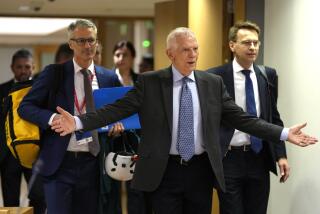Russian depositors worry about funds in Cyprus
- Share via
MOSCOW — Flights from snow-covered Russia to sunny Cyprus may be packed, but these days many of the passengers are bank account owners looking to pull their money out of the financially crippled island, not vacationers.
Russians own about a third of the $88 billion in deposits in Cyprus, which on Friday was operating under a European Central Bank warning to come up with $7.5 billion by Monday to qualify for a financial bailout. The financial mess has spooked many Russians — one proposal called for levies of up to 10% on bank deposits — at a time when Cyprus hopes Moscow will come through with financial assistance to help keep the country from falling into default.
Alexander, a Russian footwear and accessories trader, arrived in the city of Larnaca this week to try to rescue at least some of the “well over 100,000 euros,” or about $130,000, that he said he had kept in personal and corporate accounts. The fact that the euro is used by Cyprus and other members of the 17-nation Eurozone — and not Russia — once appealed to the businessman.
“I lost most of my money and most of my business in the wake of the Russian financial crisis in 1998,” Alexander, who wanted to keep his last name private, said in a phone interview. “That taught me to never trust the Russian banks and the Russian government, but now I see that even in Europe you are not safe anymore.”
On Friday, he was among the many people dealing with the Cypriot government’s limit, announced Thursday, of $336 on daily cash withdrawals from ATMs along with a ban on the use of checks and credit cards.
For Russians, the appeal of Cyprus banks lay in their lower taxes and service fees, flexibility, reduced paperwork and no-questions-asked approach. More than 30,000 Russians live in Cyprus, which has also long been considered a money-laundering hub for wealthy Russians, a problem the Kremlin alleges costs Russia billions of dollars in lost taxes.
Russian officials said Friday that any assistance from Moscow would come only after Cyprus and the European Union nations had worked out a deal to avoid a default. The warning Cyprus received from the European Central Bank required the country to come up with $7.5 billion to secure $13 billion in rescue loans from Eurozone partners and the International Monetary Fund.
Cyprus could fall into default within days if it does not receive outside aid, which could result in its exit from the Eurozone and a larger crisis that could hurt already troubled economies in Europe.
Although upset over the European plan that called for levies on bank deposits, many Russians were among those who were nevertheless stunned when officials in Cyprus this week rejected the proposal.
The proposal followed by the rejection amounted to “a public hara-kiri of the island’s banking system,” said Mikhail Delyagin, an economic expert and former Russian government advisor.
Artem Paleev, the managing partner of a law firm based in the city of Limassol, said Cypriot officials showed their “complete incompetence and impotence” in shutting down the nation’s banks.
“Now the day they open the banks their terrified clients will begin to withdraw their money en masse and the national banks will soon collapse for lack of sustainable liquidity,” Paleev said. “If they don’t open the banks Tuesday, I and people like me will have our hands full advising Russian and local residents how to lodge legal suits against the central bank, drowning it with dozens of thousands of suits.”
Paleev said that he saw long lines at ATMs along the streets of Limassol. In online forums, many users complained Friday that Laiki (Popular) Bank blocked ATM withdrawals and that supermarkets stopped accepting credit cards issued by Laiki. One user wrote that gas stations in Cyprus belonging to Russian oil giant Lukoil stopped accepting credit cards.
Financial experts said Russian oligarchs may lose somewhat in the crisis, but their losses are not likely to be devastating. Others may suffer more significant losses, they said.
“It is middle-class people and medium-size businesses that will be worst hit as Cyprus’ finances and economy unhinge and throw the country into turmoil, chaos and uncertainty,” Delyagin said.
Tatyana Mosolova, 41, a Russian freelance journalist who settled in Larnaca two years ago with her husband, a Moscow architect, and two children, said the family wanted a quiet and safe life at the seaside “enjoying the sun all year round.” Lately, she has been standing in line each day to withdraw money from her $9,000 bank account.
“I would be more than willing to pay the proposed cuts and be done with it if it can avert the crisis,” she said in a phone interview. “Now everybody is really scared that the country will declare a banking default with unpredictable consequences.
“For the time being we are managing somehow,” she said, “and, after all, the sun and the sea will hardly default on us, whatever happens with the banks.”
More to Read
Sign up for Essential California
The most important California stories and recommendations in your inbox every morning.
You may occasionally receive promotional content from the Los Angeles Times.













